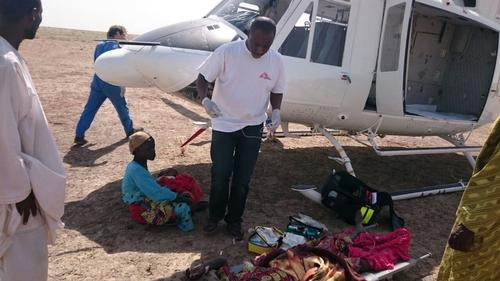On 17 January at least 90 people were killed and 120 wounded in an airstrike carried out by the Nigerian military on a camp for displaced people in Rann, in the east of Nigeria's Borno state. An MSF medical team, which had started work in the camp just a few days earlier, provided first aid to 120 wounded people in the tented clinic – the only health facility in the area. MSF medical coordinator Mohammed Musoke joined the MSF team in Rann the day after the bombing to help evacuate the wounded to the regional capital, Maiduguri.

"The team on the ground in Rann on Tuesday, the day of the bombing, was able to stabilise some of the casualties. On Wednesday, one of the nurses and I travelled to Rann by helicopter to help evacuate patients.
One day after the bombing, many of the patients were still in very bad shape. We saw dozens with multiple traumatic injuries, including open fractures and wounds to the abdomen and chest. Most of the dead and injured were women and children.
There was a 10-year-old boy with a large, deep flesh wound to his thigh. The flesh was hanging loose on one side and you could see through to the bone. This kind of wound is extremely painful, but all the time that I was applying bandages, he stayed expressionless and numb. This was 24 hours after the bombing. He is going to need a lot of psychosocial care to come to terms with this, as well as extensive physiotherapy to be able to walk again.
Another patient I saw was a six-year-old boy whose palm had been punctured and burnt by a piece of shrapnel, leaving his hand necrotic. The chances of him losing his hand are high.
There are no hospitals in Rann – the nearest health facility is at least 30 kilometres away, in Ngala. It takes two hours to get there by car because of the poor roads and the insecurity, which requires all vehicles to have a military escort. That's why we were evacuating patients to Maiduguri.
My colleague and I personally evacuated a number of severely injured patients, taking them to various hospitals in Maiduguri. One was a baby of six months, who had a piece of shrapnel embedded in his neck, leaving a puncture wound. In the helicopter, the child was crying uncontrollably. He was obviously dehydrated and his mother asked if she could give him something to drink. I handed her the water I had, and she poured some into her hand and into the child's mouth. He gulped it in a way that was surprising for a baby of six months. Within a short time, he had fallen asleep.
The place where people are living in Rann is a wide, open space, like a desert, with small trees growing here and there. The displaced people are living with the host community in makeshift shelters made out of branches, sacks, old clothes and straw.
People we talked to there said it was extremely difficult to get enough to eat, mainly due to the insecurity. Most people make a living by selling firewood which they collect in the bush but, to go anywhere, they need permission from the military. They have to go very deep into the bush to find the firewood, and they are fearful of Boko Haram's presence in the area and of being attacked."


